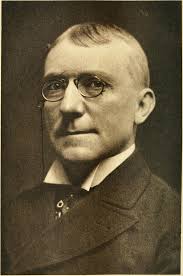Armazindy Page #8
James Whitcomb Riley poems book published in the 1894 book Armazindy and received very negative reviews that referred to poems like "The Little Dog-Woggy" and "Jargon-Jingle" as "drivel" and to Riley as a "worn out genius". Most of his growing number of critics suggested that he ignored the quality of the poems for the sake of making money.
Och, Nora! It’s hopin’ Your windy ye’ll open And light up the night where the heart av me’s gropin’. THE LITTLE WHITE HEARSE As the little white hearse went glimmering by— The man on the coal-cart jerked his lines, And smutted the lid of either eye, And turned and stared at the business signs; And the street-car driver stopped and beat His hands on his shoulders, and gazed up-street Till his eye on the long track reached the sky— As the little white hearse went glimmering by. As the little white hearse went glimmering by— A stranger petted a ragged child In the crowded walks, and she knew not why, But he gave her a coin for the way she smiled; And a boot-black thrilled with a pleasure strange, As a customer put back his change With a kindly hand and a grateful sigh, As the little white hearse went glimmering by. As the little white hearse went glimmering by— A man looked out of a window dim, And his cheeks were wet and his heart was dry, For a dead child even were dear to him! And he thought of his empty life, and said:— “Loveless alive, and loveless dead— Nor wife nor child in earth or sky!” As the little white hearse went glimmering by. WHAT REDRESS I pray you, do not use this thing For vengeance; but if questioning What wound, when dealt your humankind, Goes deepest,—surely he will find Who wrongs you, loving him no less— There’s nothing hurts like tenderness. DREAMER, SAY Dreamer, say, will you dream for me A wild sweet dream of a foreign land, Whose border sips of a foaming sea With lips of coral and silver sand; Where warm winds loll on the shady deeps, Or lave themselves in the tearful mist The great wild wave of the breaker weeps O’er crags of opal and amethyst? Dreamer, say, will you dream a dream Of tropic shades in the lands of shine, Where the lily leans o’er an amber stream That flows like a rill of wasted wine,— Where the palm-trees, lifting their shields of green, Parry the shafts of the Indian sun Whose splintering vengeance falls between The reeds below where the waters run? Dreamer, say, will you dream of love That lives in a land of sweet perfume, Where the stars drip down from the skies above In molten spatters of bud and bloom? Where never the weary eyes are wet, And never a sob in the balmy air, And only the laugh of the paroquet Breaks the sleep of the silence there? WHEN LIDE MARRIED HIM When Lide married him—w’y, she had to jes dee-fy The whole popilation!—But she never bat’ an eye! Her parents begged, and threatened—she must give him up—that he Wuz jes “a common drunkard!”—And he wuz, appearantly.— Swore they’d chase him off the place Ef he ever showed his face— Long after she’d eloped with him and married him fer shore!— When Lide married him, it wuz “Katy, bar the door!” When Lide married him—Well! she had to go and be A hired girl in town somewheres—while he tromped round to see What he could git that he could do,—you might say, jes sawed wood From door to door!—that’s what he done—’cause that wuz best he could! And the strangest thing, i jing! Wuz, he didn’t drink a thing,— But jes got down to bizness, like he someway wanted to, When Lide married him, like they warned her not to do! When Lide married him—er, ruther, had be’n married A little up’ards of a year—some feller come and carried That hired girl away with him—a ruther stylish feller In a bran-new green spring-wagon, with the wheels striped red and yeller: And he whispered, as they driv To’rds the country, “Now we’ll live!”— And somepin’ else she laughed to hear, though both her eyes wuz dim, ’Bout “trustin’ Love and Heav’n above, sence Lide married him!” MY BRIDE THAT IS TO BE O Soul of mine, look out and see My bride, my bride that is to be!— Reach out with mad, impatient hands, And draw aside futurity As one might draw a veil aside— And so unveil her where she stands Madonna-like and glorified— The queen of undiscovered lands Of love, to where she beckons me— My bride, my bride that is to be. The shadow of a willow-tree That wavers on a garden-wall In summer-time may never fall In attitude as gracefully As my fair bride that is to be;— Nor ever Autumn’s leaves of brown As lightly flutter to the lawn As fall her fairy-feet upon The path of love she loiters down.— O’er drops of dew she walks, and yet Not one may stain her sandal wet— Ay, she might dance upon the way Nor crush a single drop to spray, So airy-like she seems to me,— My bride, my bride that is to be. I know not if her eyes are light As summer skies or dark as night,— I only know that they are dim With mystery: In vain I peer To make their hidden meaning clear. While o’er their surface, like a tear That ripples to the silken brim, A look of longing seems to swim All worn and weary-like to me; And then, as suddenly, my sight Is blinded with a smile so bright, Through folded lids I still may see My bride, my bride that is to be. Her face is like a night of June Upon whose brow the crescent-moon Hangs pendent in a diadem Of stars, with envy lighting them.— And, like a wild cascade, her hair Floods neck and shoulder, arm and wrist, Till only through a gleaming mist I seem to see a Siren there, With lips of love and melody And open arms and heaving breast Wherein I fling myself to rest, The while my heart cries hopelessly For my fair bride that is to be. ... Nay, foolish heart and blinded eyes! My bride hath need of no disguise.— But, rather, let her come to me In such a form as bent above My pillow when, in infancy, I knew not anything but love.— O let her come from out the lands Of Womanhood—not fairy isles,— And let her come with Woman’s hands And Woman’s eyes of tears and smiles,— With Woman’s hopefulness and grace Of patience lighting up her face: And let her diadem be wrought Of kindly deed and prayerful thought, That ever over all distress May beam the light of cheerfulness.— And let her feet be brave to fare The labyrinths of doubt and care, That, following, my own may find The path to Heaven God designed.— O let her come like this to me— My bride—my bride that is to be. “RINGWORM FRANK” Jest Frank Reed’s his real name—though Boys all calls him “Ringworm Frank,” ’Cause he allus runs round so.— No man can’t tell where to bank Frank’ll be, Next you see Er hear of him!—Drat his melts!— That man’s allus somers else! We’re old pards.—But Frank he jest
Translation
Translate and read this book in other languages:
Select another language:
- - Select -
- 简体中文 (Chinese - Simplified)
- 繁體中文 (Chinese - Traditional)
- Español (Spanish)
- Esperanto (Esperanto)
- 日本語 (Japanese)
- Português (Portuguese)
- Deutsch (German)
- العربية (Arabic)
- Français (French)
- Русский (Russian)
- ಕನ್ನಡ (Kannada)
- 한국어 (Korean)
- עברית (Hebrew)
- Gaeilge (Irish)
- Українська (Ukrainian)
- اردو (Urdu)
- Magyar (Hungarian)
- मानक हिन्दी (Hindi)
- Indonesia (Indonesian)
- Italiano (Italian)
- தமிழ் (Tamil)
- Türkçe (Turkish)
- తెలుగు (Telugu)
- ภาษาไทย (Thai)
- Tiếng Việt (Vietnamese)
- Čeština (Czech)
- Polski (Polish)
- Bahasa Indonesia (Indonesian)
- Românește (Romanian)
- Nederlands (Dutch)
- Ελληνικά (Greek)
- Latinum (Latin)
- Svenska (Swedish)
- Dansk (Danish)
- Suomi (Finnish)
- فارسی (Persian)
- ייִדיש (Yiddish)
- հայերեն (Armenian)
- Norsk (Norwegian)
- English (English)
Citation
Use the citation below to add this book to your bibliography:
Style:MLAChicagoAPA
"Armazindy Books." Literature.com. STANDS4 LLC, 2025. Web. 10 Mar. 2025. <https://www.literature.com/book/armazindy_946>.








Discuss this Armazindy book with the community:
Report Comment
We're doing our best to make sure our content is useful, accurate and safe.
If by any chance you spot an inappropriate comment while navigating through our website please use this form to let us know, and we'll take care of it shortly.
Attachment
You need to be logged in to favorite.
Log In